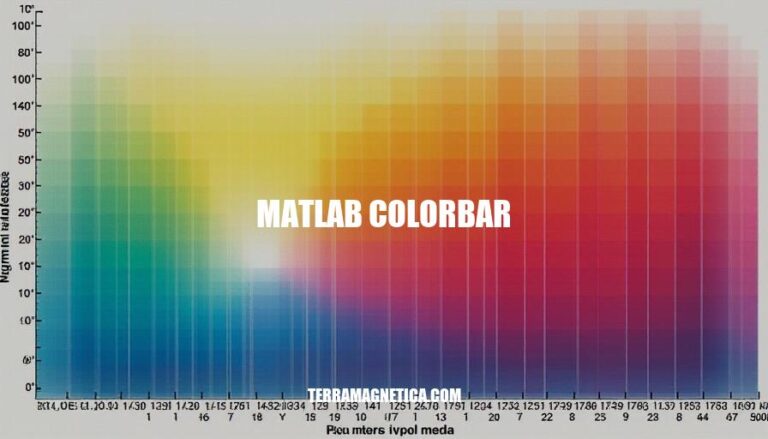


The ‘colorbar’ in MATLAB is a graphical element that maps data values to colors, often used in conjunction with contour plots, heatmaps, and surface plots. It acts as a legend that provides a visual reference for interpreting the color gradient or colormap applied to data visualizations. This is crucial for understanding complex data representations, as it links the visual spectrum to actual data values, enhancing the clarity and interpretability of the graphical output.
Through the effective use of colorbars, MATLAB enables users to communicate data insights more effectively, making it an invaluable tool for scientists, engineers, and analysts.
Here’s how you can add a colorbar to a plot in MATLAB:
First, create your plot.
Then, use the colorbar function to add a colorbar.
Here’s a basic example:
% Generate some data data = peaks(20); % Create a surface plot figure; surf(data); % Add a colorbar colorbar;
The colorbar function will add a colorbar to the current axes, providing a scale reference for the data values displayed in the plot.
colorbar adds a colorbar to the current axes. Here’s how to customize it:
Changing the orientation:
colorbar('orientation', 'horizontal');
Setting the limits:
c = colorbar; c.Limits = [0 1];
Adding labels:
c = colorbar; c.Label.String = 'Intensity'; c.Label.FontSize = 12; c.Label.FontWeight = 'bold';
Customizing ticks and tick labels:
c = colorbar;
c.Ticks = [0 0.5 1];
c.TickLabels = {'Low', 'Medium', 'High'};
Positioning the colorbar:
c = colorbar; c.Position = [0.8 0.1 0.05 0.8];
You can combine these commands to suit your specific customization needs. Dive in and make your colorbar pop!
To adjust the color scale in MATLAB, you use caxis. This function sets the colormap limits for the current axes. For instance, caxis([min max]) sets the color axis limits.
For integrating colorbars with multiple plots, you can use subplot and colorbar functions in combination. Example:
subplot(1,2,1); surf(peaks); caxis([0 10]); colorbar; subplot(1,2,2); imagesc(rand(10)); caxis([0 1]); colorbar;
This code generates two plots, each with its own colorbar. Advanced customizations may involve setting specific tick marks on the colorbar using colorbar('Ticks', [values]) and modifying its labels with colorbar('TickLabels', {'label1', 'label2', ...}).
To have precise control over the colormap itself, you can use colormap to define it explicitly. For example, colormap(jet) applies the jet colormap to the current figure.
For AI prompts to generate detailed instructions for these features, try:
“Generate MATLAB code to set specific color scales for a colorbar in a surface plot.”
“Provide MATLAB code to integrate colorbars with multiple subplots, each having independent color scales.”
“Create detailed MATLAB instructions on customizing colorbar tick marks and labels in a heatmap.”
Combine these elements in your projects to fully harness the power of MATLAB’s colorbar customization.
Colorbar not displaying correctly: The colorbar may not appear or may not display the correct colors.
Colorbar limits not set properly: The colorbar limits do not match the data range.
Colorbar not aligned properly: The colorbar is not positioned correctly relative to the plot.
Colorbar not shared among subplots: When using multiple subplots, the colorbar is not shared among them.
Colorbar not interactive: The colorbar does not respond to user interactions.
Solution: Ensure that the colorbar is properly called after the plot command.
surf(peaks); colorbar;
Solution: Use the caxis function to set the color limits.
surf(peaks); caxis([minValue, maxValue]); colorbar;
Solution: Use the Position property to set the location of the colorbar.
surf(peaks);
colorbar('Position', [0.9 0.1 0.02 0.8]);
Solution: Use the tiledlayout and nexttile functions to create a tiled layout and share the colorbar.
tiledlayout(2,1);
nexttile;
surf(peaks);
nexttile;
contour(peaks);
colorbar('Layout', 'tiled');
Solution: Ensure that the figure window is active and not in a background process.
drawnow;
Verify that the colorbar is called after the plot command.
Ensure that the figure window is active.
Use the caxis function to set the color limits.
Verify that the limits match the data range.
Use the Position property to set the location of the colorbar.
Adjust the position values to align the colorbar correctly.
Use the tiledlayout and nexttile functions to create a tiled layout.
Call the colorbar function with the Layout property set to ’tiled’.
Call the drawnow function to refresh the figure.
Verify that the colorbar responds to user interactions.
By following these steps, you can resolve common issues with the MATLAB colorbar and ensure it functions correctly in your plots.
The MATLAB colorbar is a graphical element that maps data values to colors, often used in conjunction with contour plots, heatmaps, and surface plots. It acts as a legend that provides a visual reference for interpreting the color gradient or colormap applied to data visualizations. This is crucial for understanding complex data representations, as it links the visual spectrum to actual data values, enhancing the clarity and interpretability of the graphical output.
To add a colorbar to a plot in MATLAB, use the `colorbar` function after creating your plot. You can customize the colorbar by changing its orientation, setting limits, adding labels, customizing ticks and tick labels, and positioning it.
Some common issues with MATLAB colorbars include not displaying correctly, having incorrect limits, being misaligned, not sharing among subplots, and not being interactive. Solutions to these issues involve ensuring the colorbar is properly called after the plot command, using the `caxis` function to set color limits, adjusting the position of the colorbar, creating a tiled layout to share the colorbar among subplots, and refreshing the figure with the `drawnow` function.
Experimenting with different customizations can help you effectively use the MATLAB colorbar in your data visualizations. By following these steps, you can resolve common issues and ensure that your colorbars function correctly.